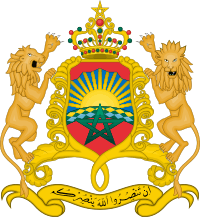1997 Moroccan general election
Parliamentary elections were held in Morocco on 14 November 1997. The result was a victory for the Socialist Union of Popular Forces, which won 57 of the 319 seats in the Assembly of Representatives. Voter turnout was 58.3%.[1]
| |||||||||||||||||||||||||||||||||||||||||||||||||||||||||||||||||||||||||||||||||
325 seats in the House of Representatives 163 seats needed for a majority | |||||||||||||||||||||||||||||||||||||||||||||||||||||||||||||||||||||||||||||||||
|---|---|---|---|---|---|---|---|---|---|---|---|---|---|---|---|---|---|---|---|---|---|---|---|---|---|---|---|---|---|---|---|---|---|---|---|---|---|---|---|---|---|---|---|---|---|---|---|---|---|---|---|---|---|---|---|---|---|---|---|---|---|---|---|---|---|---|---|---|---|---|---|---|---|---|---|---|---|---|---|---|---|
This lists parties that won seats. See the complete results below. | |||||||||||||||||||||||||||||||||||||||||||||||||||||||||||||||||||||||||||||||||
| |||||||||||||||||||||||||||||||||||||||||||||||||||||||||||||||||||||||||||||||||
 |
|---|
| This article is part of a series on the politics and government of Morocco |
|
Monarchy |
|
Government |
| Judiciary |
|
|
|
|
|
|
Results
| Party | Votes | % | Seats | +/- |
|---|---|---|---|---|
| Socialist Union of Popular Forces | 884,061 | 13.9 | 57 | +5 |
| Istiqlal Party | 840,315 | 13.8 | 32 | -20 |
| National Rally of Independents | 705,397 | 11.1 | 46 | +6 |
| People's Movement | 659,331 | 10.3 | 40 | -11 |
| Constitutional Union | 647,746 | 10.2 | 50 | -4 |
| Democratic and Social Movement | 603,156 | 9.5 | 32 | New |
| National Popular Movement | 431,651 | 6.8 | 19 | -6 |
| Party of Renewal and Progress | 274,862 | 4.3 | 9 | -1 |
| National Democratic Party | 270,425 | 4.2 | 10 | -14 |
| Constitutional and Democratic Popular Movement | 264,324 | 4.1 | 9 | New |
| Front of Democratic Forces | 243,275 | 3.8 | 9 | New |
| Democratic Socialist Party | 188,520 | 3.0 | 5 | New |
| Organisation for Democratic and Popular Action | 184,009 | 2.9 | 4 | +2 |
| Action Party | 89,614 | 1.4 | 2 | 0 |
| Democratic Independence Party | 76,176 | 1.2 | 1 | -8 |
| Movement for Democracy | 8,768 | 0.1 | 0 | New |
| Invalid/blank votes | 1,085,366 | - | - | - |
| Total | 7,456,996 | 100 | 325 | -7 |
| Source: Nohlen et al. | ||||
gollark: There are other applications.
gollark: Well, not really.
gollark: It can be argued that cellular automata *are* esolangs, especially turing-complete ones.
gollark: Cellular automata are vaguely related to esolangs. I think there are some fun opportunities there.
gollark: Indeed.
References
- Nohlen, D, Krennerich, M & Thibaut, B (1999) Elections in Africa: A data handbook, p635 ISBN 0-19-829645-2
This article is issued from Wikipedia. The text is licensed under Creative Commons - Attribution - Sharealike. Additional terms may apply for the media files.